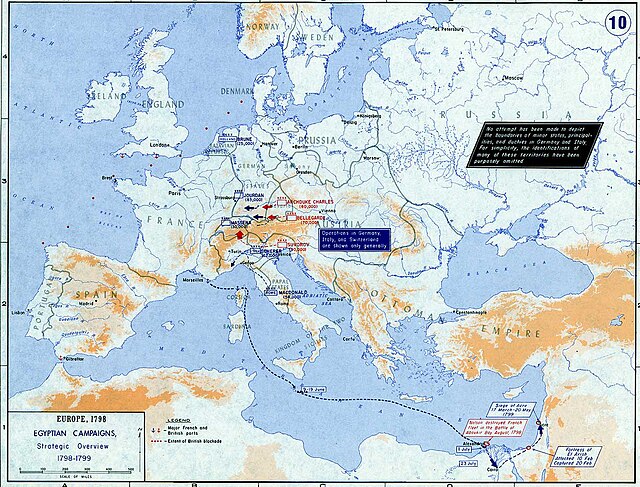French campaign in Egypt and Syria
The French campaign in Egypt and Syria (1798–1801) was a Napoleonic campaign in the Ottoman territories of Egypt and Syria, executed by Napoleon Bonaparte. Napoleon proclaimed to "defend French trade interests" and to establish "scientific enterprise" in the region. It was the primary purpose of the Mediterranean campaign of 1798, which was a series of naval engagements that included the capture of Malta and the Greek island Crete, later arriving in the Port of Alexandria. The campaign ended in defeat for Napoleon after abandoning his troops to head back to France for the looming risk of a Second Coalition. This led to the death and withdrawal of French troops in the region.
French campaign in Egypt and Syria
Tipu, Sultan of Mysore, an ally of Napoleone Bonaparte, confronted British East India Company forces at the Siege of Srirangapatna, where he was killed.
Landing of Napoleon's troops in Egypt in July 1798
Kléber wounded in front of Alexandria, engraving by Adolphe-François Pannemaker
The Napoleonic era is a period in the history of France and Europe. It is generally classified as including the fourth and final stage of the French Revolution, the first being the National Assembly, the second being the Legislative Assembly, and the third being the Directory. The Napoleonic era begins roughly with Napoleon Bonaparte's coup d'état, overthrowing the Directory, establishing the French Consulate, and ends during the Hundred Days and his defeat at the Battle of Waterloo. The Congress of Vienna soon set out to restore Europe to pre-French Revolution days. Napoleon brought political stability to a land torn by revolution and war. He made peace with the Roman Catholic Church and reversed the most radical religious policies of the Convention. In 1804 Napoleon promulgated the Civil Code, a revised body of civil law, which also helped stabilize French society. The Civil Code affirmed the political and legal equality of all adult men and established a merit-based society in which individuals advanced in education and employment because of talent rather than birth or social standing. The Civil Code confirmed many of the moderate revolutionary policies of the National Assembly but retracted measures passed by the more radical Convention. The code restored patriarchal authority in the family, for example, by making women and children subservient to male heads of households.

The Emperor Napoleon in His Study at the Tuileries by Jacques-Louis David
Strategic situation of Europe 1798
Strategic situation of Europe 1801
Strategic situation of Europe 1803








